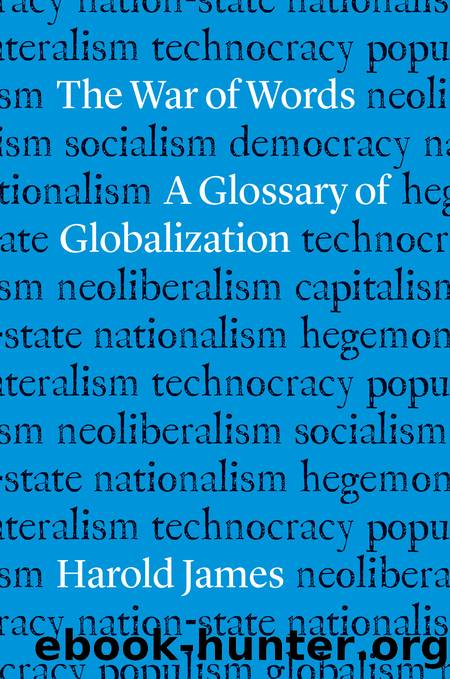The War of Words: A Glossary of Globalization by Harold James

Author:Harold James [James, Harold]
Language: eng
Format: epub
ISBN: 9780300258295
Google: mCQ7EAAAQBAJ
Publisher: Yale University Press
Published: 2021-09-21T00:24:27.274523+00:00
A New Sort of Technocrat
By the beginning of the twenty-first century, the link between technocrats and war had been reframed, as the boundaries between conventional war and other sorts of influence became blurred. The practitioners of a new hybrid war called themselves technologists, and the concept of political technology emerged after the collapse of the Soviet Union, often using techniques of opinion manipulation that had been developed by the Soviet security apparatus. The 1996 election in the Russian Federation, won unexpectedly by Boris Yeltsin, was a watershed, and the 1999 arrangement to preserve Yeltsinâs regime with a transition to Vladimir Putin may have marked a high point, according to Andrew Wilson, one of the main analysts of the phenomenon. Wilson quotes one of the technologists, Sergey Markov, as stating that âall political technologies abolish the difference between the true and the not-true.â There were political lessons to be learned from advertising and consumer capitalism: âPeople believe they buy certain goods because they make the decision, but itâs not true. Public opinion is made more and more by computers, which have no opinion of their own. They totally depend on what disk is inserted.â51
This sort of approach spread rapidly beyond Russia. Elections could be won by targeting the right audiences with selective messages designed to nudge them. Both sides in any campaign thought that the other was using more sophisticated techniques, and the outcome was ascribed not to the power or coherence or attraction of an argument, but to how micro-arguments had been matched to their best audience. The major figures who won elections were no longer the political figureheads, but the controllers of information. The result was sometimes called guru-ism. Barack Obama, for example, is credited with mobilizing a youthquake in 2008 when his young and enthusiastic campaigners successfully targeted particular voting groups and helped him win the US presidency. By 2012, after a bad setback in the midterm elections, the campaign was depending on the analysis of big data for finding and motivating new groups of potential voters.52 The chief analytics officer on Barack Obamaâs 2012 election campaign, and the founder of Civis Analytics in 2013 (with financial support from Google) was Dan Wagner, a mathematician in his early twenties. Wagner used Facebook groups of âfriendsâ to identify some 15 million âpersuadable votersâ in the swing states.53
In 2015, David Cameronâs Conservatives in Britain won with the assistance of Jim Messina, who had been a significant force behind the design of the 2012 Obama campaign, âthe most data-driven campaign ever.â The successful strategy involved persuading voters that a vote for the Liberal Democrats would be a vote for Labour, and that Labour and the Scottish National Party were likely to break up the country. In the 2016 Brexit referendum, Dominic Cummings believed that the result was due to the operations director of Vote Leave, Victoria Woodcock, who devised a âcanvassing softwareâ named after her: âVicsâ or Voter Intention Collection System.54 Zac Moffatt, Mitt Romneyâs former digital director who founded the company Targeted Victory, explained: âSoftware is eating politics.
Download
This site does not store any files on its server. We only index and link to content provided by other sites. Please contact the content providers to delete copyright contents if any and email us, we'll remove relevant links or contents immediately.
Zero to IPO: Over $1 Trillion of Actionable Advice from the World's Most Successful Entrepreneurs by Frederic Kerrest(4510)
Machine Learning at Scale with H2O by Gregory Keys | David Whiting(4292)
Never by Ken Follett(3937)
Harry Potter and the Goblet Of Fire by J.K. Rowling(3848)
Ogilvy on Advertising by David Ogilvy(3604)
Shadow of Night by Deborah Harkness(3359)
The Man Who Died Twice by Richard Osman(3072)
Book of Life by Deborah Harkness(2930)
The Tipping Point by Malcolm Gladwell(2914)
Will by Will Smith(2908)
0041152001443424520 .pdf by Unknown(2843)
My Brilliant Friend by Elena Ferrante(2824)
Purple Hibiscus by Chimamanda Ngozi Adichie(2823)
How Proust Can Change Your Life by Alain De Botton(2805)
How to Pay Zero Taxes, 2018 by Jeff A. Schnepper(2646)
Hooked: A Dark, Contemporary Romance (Never After Series) by Emily McIntire(2547)
Rationality by Steven Pinker(2352)
Can't Hurt Me: Master Your Mind and Defy the Odds - Clean Edition by David Goggins(2323)
Borders by unknow(2303)
